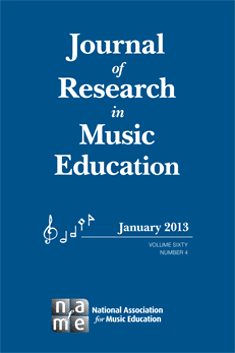
JOURNAL OF RESEARCH IN MUSIC EDUCATION
Scope & Guideline
Cultivating Knowledge for a Musical Tomorrow
Introduction
Aims and Scopes
- Music Teaching and Learning Processes:
Investigates various methodologies and pedagogical strategies in music education, including the dynamics of teaching, learning, and assessment in diverse educational settings. - Cultural and Social Contexts of Music Education:
Explores the impact of cultural identity, social justice, and diversity on music education practices, emphasizing the role of music in shaping personal and communal identities. - Music Education Policy and Equity:
Analyzes policies affecting music education access and equity, addressing systemic issues that influence participation and achievement in music programs. - Professional Development for Music Educators:
Focuses on the continuous growth and training of music educators, including studies on mentorship, professional learning communities, and the effectiveness of professional development programs. - Music Education Research Methodologies:
Encourages innovative research methodologies and theoretical frameworks in music education research, ranging from qualitative to quantitative approaches.
Trending and Emerging
- Social Justice and Equity in Music Education:
Recent publications increasingly focus on social justice issues within music education, addressing the need for equitable access and representation in music programs. - Music Education for Diverse Learners:
There is a growing emphasis on research concerning music education practices for students with diverse needs, including those with disabilities, highlighting inclusive teaching methods. - Impact of Technology on Music Learning:
Studies examining the role of technology in music education are on the rise, exploring how digital tools can enhance teaching, learning, and student engagement. - Identity and Personal Narratives in Music Education:
Emerging research is placing greater importance on the personal identities and experiences of music educators and students, particularly regarding race, gender, and cultural background. - Mental Health and Wellbeing in Music Education:
An increasing number of studies are addressing the mental health challenges faced by music educators and students, focusing on coping strategies and supportive practices.
Declining or Waning
- Traditional Music Education Models:
There has been a noticeable decrease in studies centered around traditional, classical music education models, as contemporary discussions increasingly favor diverse and inclusive practices. - Performance-Focused Pedagogy:
Research emphasizing solely technical performance skills without contextual or emotional engagement is waning, as the field moves towards holistic approaches that value creativity and expression. - General Music Education Programs:
The frequency of studies on general music education programs, particularly in K-12 settings, appears to be decreasing, likely overshadowed by more specialized areas such as instrumental and ensemble-focused research. - Standardized Assessment Methods:
There is a decline in research focused on standardized assessment methods in music education, as educators and researchers seek more authentic and individualized evaluation approaches.
Similar Journals
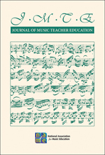
Journal of Music Teacher Education
Empowering Educators with Cutting-Edge Insights.The Journal of Music Teacher Education, published by SAGE Publications Inc, is a leading scholarly outlet dedicated to advancing the field of music education. With an ISSN of 1057-0837 and an E-ISSN of 1945-0079, this journal explores a wide array of topics pertinent to music teaching and learning, serving as a vital resource for both researchers and practitioners in the music education community. Since its inception in 1991, it has consistently been positioned among the top-tier journals in both music and education, achieving a notable Q1 ranking in music and Q2 in education as of 2023. With impressive Scopus rankings, placing it in the 89th percentile for music and 47th percentile for education, the journal plays a crucial role in facilitating dialogue and disseminating innovative research aimed at improving music pedagogy. While not an open-access publication, it provides access to invaluable insights and practices that inform both theory and application in music education, making it an essential read for educators, students, and researchers alike, as they navigate the evolving landscape of music teaching. Explore the latest findings and thought-provoking discussions that shape the future of music education in the United States and beyond.

Revista Electronica de LEEME
Pioneering Scholarly Impact in Music and Education.Revista Electronica de LEEME, published by UNIV RIOJA, DEPT EXPRESION ARTISTICA, is a distinguished open-access journal that has been a vital resource in the fields of education and music since its inception in 1998. With a strong presence in Spain and an impressive Q1 ranking in Music and Q2 in Education as of 2023, the journal has established itself as a leading platform for high-quality research in the Arts and Humanities. The journal’s Scopus ranks demonstrate its scholarly impact, particularly its ranking of 21 out of 180 in Music, showcasing an 88th percentile standing, while it holds the 838 out of 1543 position in Education, reflecting its critical relevance in this domain. Covering a diverse array of topics related to artistic expression and pedagogical innovation, the Revista Electronica de LEEME aims to enrich the academic landscape by promoting open scholarship and accessible knowledge sharing. Researchers, professionals, and students are encouraged to engage with its comprehensive articles and findings, which are available free of charge, fostering a global dialogue among scholars dedicated to advancing education and musicology.
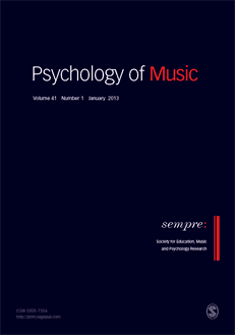
Psychology of Music
Exploring the Harmony of Mind and MelodyPsychology of Music is a prominent academic journal published by SAGE Publications Inc, focusing on the interdisciplinary field that bridges psychological principles and musical expression. Established in 1973, this esteemed journal plays a crucial role in advancing understanding of how music affects emotions, cognition, and social interactions, thus catering to a diverse audience of researchers, educators, and practitioners in both psychology and music. With an impressive impact factor that places it in the Q1 category for Music and Q2 for Psychology (miscellaneous) in 2023, this journal ranks 3rd out of 180 in Arts and Humanities – Music, and 19th out of 97 in Psychology (miscellaneous) according to Scopus metrics, affirming its authoritative contribution to the field. The Psychology of Music is essential for those looking to explore cutting-edge research, methodologies, and applications, providing rich insights and fostering discussions that reach into music therapy, education, and psychological wellness. Although it is not an open-access journal, its high-quality peer-reviewed articles are pivotal for anyone dedicated to the intricate relationship between music and the mind, making it a must-read for professionals and students alike.
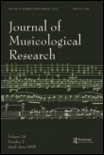
JOURNAL OF MUSICOLOGICAL RESEARCH
Celebrating the Intersection of Music and AcademiaJOURNAL OF MUSICOLOGICAL RESEARCH, published by Taylor & Francis Ltd, is an esteemed platform that delves into the field of musicology, contributing to the ongoing dialogue in music research and scholarship since its establishment in 1979. With an ISSN of 0141-1896 and an E-ISSN of 1547-7304, this journal serves as a vital resource for researchers, professionals, and students, offering insights into diverse musicological topics. Although currently categorized in Q4 in Music with Scopus rankings placing it at #110 out of 180 in the Arts and Humanities field, its commitment to excellence and broader discourses in music studies is evident. The journal does not have Open Access options, yet it provides accessible content through reputable academic channels, fostering scholarly exchanges within the community. It aims to publish high-quality research that advances understanding of musical practices and cultural implications, making it a critical resource for those passionate about music and its myriad influences.

BULLETIN OF THE COUNCIL FOR RESEARCH IN MUSIC EDUCATION
Shaping the Future of Music Education ResearchBULLETIN OF THE COUNCIL FOR RESEARCH IN MUSIC EDUCATION, published by UNIV ILLINOIS PRESS, is a premier scholarly journal dedicated to advancing the field of music education through rigorous research and critical discourse. With an ISSN of 0010-9894 and E-ISSN 2162-7223, this journal plays a significant role in disseminating innovative findings and educational practices, ranking in Q1 for Music and Q2 for Education as of 2023. The journal's esteemed position is further highlighted by its Scopus ranking, placing it in the 80th percentile among music-related publications. Covering a time span from 2002 to 2024, it serves as a vital resource for educators, researchers, and graduate students alike. Although the journal does not currently offer open access, its contributions remain crucial in shaping music education research and practice. The BULLETIN not only inspires scholarly inquiry but also enhances the discourse surrounding effective music education methodologies.

Opus
Unveiling the Dimensions of Musical DiscourseOpus is an esteemed open-access journal published by the Associação Nacional de Pesquisa e Pós-Graduação em Música in Brazil, focusing on the field of music studies. With an ISSN of 1517-7017, Opus has been dedicated to fostering innovative research since its inception and has embraced the open-access model since 2009, ensuring that its findings are readily accessible to scholars and enthusiasts globally. The journal has achieved a commendable Q2 ranking in Music as of 2023, showcasing its impact and relevance within the arts and humanities. Although currently ranked #130 out of 180 in Scopus in the music category, Opus maintains a commitment to enhancing the scholarly discourse in musicology through empirical studies, theoretical analyses, and interdisciplinary approaches. The journal's convergence over the years, from 2017 to 2024, reflects its dedication to evolving educational and research methodologies in music. Situated in the vibrant academic landscape of Campinas, SP, Brazil, Opus invites researchers, professionals, and students to contribute to its mission of exploring the multifaceted dimensions of music.
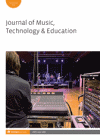
Journal of Music Technology & Education
Connecting the dots between music, technology, and pedagogy.Welcome to the Journal of Music Technology & Education, a leading academic journal dedicated to the intersection of music, technology, and pedagogical practices. Published by INTELLECT LTD in the United Kingdom, this journal has gained considerable recognition within the scholarly community, particularly noted for its strong rankings across multiple disciplines. As of 2023, it holds a prestigious Q1 quartile position in Music, Q2 in Education, and Q3 in Computer Science Applications, highlighting its multifaceted impact on various fields. Spanning over a decade from 2012 to 2023, the journal features rigorous peer-reviewed articles that explore innovative approaches to music education, technology integration in teaching practices, and advancements in digital music creation. Researchers, educators, and students alike will find valuable insights and cutting-edge research to keep them at the forefront of this rapidly evolving landscape. Access to the journal's content is available to a broad audience, making it a vital resource for anyone interested in the vibrant world of music technology.
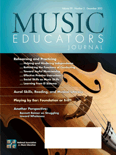
MUSIC EDUCATORS JOURNAL
Connecting Theory and Practice in Music TeachingMUSIC EDUCATORS JOURNAL, published by SAGE PUBLICATIONS INC, serves as an essential resource for researchers, educators, and practitioners in the fields of music education and broader educational practices. With its ISSN 0027-4321 and E-ISSN 1945-0087, this prestigious journal has been integral in advancing the discourse surrounding music pedagogy since its inception. Operating without an open access model, it boasts impressive rankings, placing it in the Q1 category for Music and Q2 for Education according to 2023 quartiles, illustrating its significant contribution to these fields. The journal is recognized in Scopus with a rank of #34 out of 180 in Arts and Humanities - Music, further solidifying its reputation as a premier publication. Aimed at enlightening its readership through empirical research, innovative teaching practices, and critical examinations of music education reform, the MUSIC EDUCATORS JOURNAL is an invaluable platform for fostering dialogue and discovery, making it a must-read for all engaged in the music education landscape.

FONTES ARTIS MUSICAE
Exploring the intersections of music, scholarship, and creativity.FONTES ARTIS MUSICAE, with ISSN 0015-6191 and E-ISSN 2471-156X, is a distinguished journal published by A-R EDITIONS, specializing in the fields of Music and Library and Information Sciences. Established in the United States, this journal serves as a vital resource for scholars, practitioners, and students engaged in the exploration and analysis of music and its associated disciplines. With an established converged publication history from 2002 to 2024, FONTES ARTIS MUSICAE has consistently contributed to the discourse within its scope, reflected in its current quartile rankings of Q4 in Library and Information Sciences and Q3 in Music for 2023. Although not an open-access journal, it offers essential insights and research findings, appealing to a diverse academic audience. Its position within the 18th percentile of the Arts and Humanities (Music) category and 11th percentile in Library and Information Sciences underscores its growing significance in these fields, making it a critical platform for advancing knowledge and fostering collaboration.
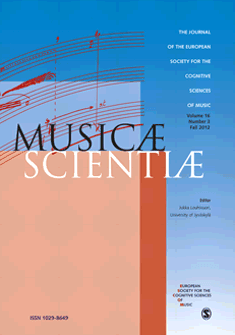
MUSICAE SCIENTIAE
Unveiling the Psychological Dimensions of Musical ExperienceMUSICAE SCIENTIAE, published by SAGE Publications Ltd, is a prestigious interdisciplinary journal situated at the intersection of music and psychological studies. Established in 1997, this journal has garnered an impressive reputation, as evidenced by its 2023 Scopus rankings, where it ranks #2 in Music (Arts and Humanities) and #51 in Experimental and Cognitive Psychology. With a considerable impact factor and categorized in the Q1 and Q2 quartiles, it stands as a key resource for researchers, students, and professionals interested in the cognitive processes related to music engagement and its applications. Although it does not operate under an open access model, MUSICAE SCIENTIAE provides valuable insights and empirical studies that contribute to the ever-evolving understanding of music's impact on human behavior and cognition. By fostering a robust platform for scholarly dialogue, this journal continues to significantly influence research and practice within its fields.